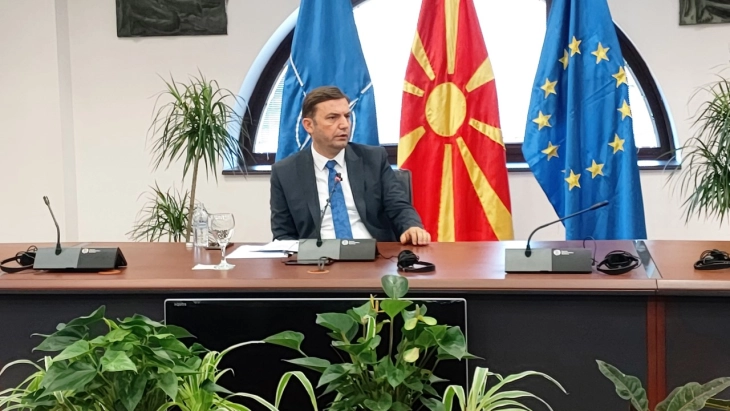Osmani: Screening process right after first IGC, opening of negotiations to be completed after constitutional changes

Skopje, 17 July 2022 (MIA) - Reciprocity is the principle included in the protocol, signed Sunday in Sofia by North Macedonia's Foreign Minister Bujar Osmani and his Bulgarian counterpart Teodora Genchovska. Legally speaking, the document is in fact a written record of a meeting outlining the results achieved from the dialogue and inter-sectoral cooperation between 2019 and 2022. Since the intergovernmental commission hadn't been convened since 2019 after the Bulgarian veto, the document signed today contains a three-year period. This document should be in fact signed once a year.
At a press briefing in Skopje, Minister Osmani presented the Protocol's content. In addition to information on the political dialogue, meetings, the work of intersectoral groups, the document contains items from the 4+1 package and what is expected from the two countries in these areas according to the Friendship Treaty.
Support for North Macedonia's EU integration is an integral part of the Protocol, where the holding of the first Intergovernmental Conference (IGC) with the EU is explained. In this case, it is divided into two phases - political conference, opening of the screening process, followed by a second conference and the opening of chapters only after North Macedonia changes the Constitution to include the Bulgarians.
Osmani told the press briefing that the screening process will be launched right after the intergovernmental conference on July 19.
Bulgaria has expressed readiness to agree to the first political intergovernmental conference with the EU with an understanding that the next intergovernmental conference to complete the opening of negotiations phase will be held right after North Macedonia in its Constitution includes its citizens that live on the territory of the country and are part of other peoples, such as the Bulgarian people, according to the Protocol.
"According to the French proposal, the intergovernmental conference will take place the day after tomorrow before the screening process opens, expected to take a year and a half. The screening process will be followed by a second intergovernmental conference which doesn't require a European Council decision. Decisions will be made tomorrow at 6:30 pm about the two conferences - about the first one before the screening and about the second one after this process, however the second conference is conditioned by constitutional changes," said Osmani.
He stressed that "part of other peoples" means the same what other communities in the country have. The section where it reads Serbian, Vlach, Roma people, will continue with Croatian, Montenegrin, Bulgarian people. This isn't a novelty, Osmani added mentioning Croatia, which had included 25 communities in the Constitution before joining the Union.
The document states that the government of North Macedonia agrees that the next intergovernmental session to complete the opening of negotiations phase should be held after the constitutional changes are enforced to include its citizens that live on the territory of the country and are part of other peoples, such as the Bulgarian people, according to internal procedures.
"There was a speculation - how can the government take an obligation on behalf of Parliament. The government isn't doing this, instead the government agrees that the second conference should happen after Parliament approves the inclusion of communities," the Minister added.
The Bulgarian government right after the adoption of the Council of the EU conclusions, according to the final proposal of the French presidency, expresses readiness to withdraw its reserves over the conclusion of an agreement between the EU and North Macedonia involving the Frontex status.
Asked why isn't there reciprocity regarding the rights of the Macedonian minority in Bulgaria, Osmani said that Bulgaria's constitutional order doesn't recognize ethnic communities, the same as the constitutions of France and Greece.
"The Constitution doesn't recognize citizens organizing on ethnic origin basis. Our Constitution is different. Under the Friendship Treaty, North Macedonia confirms that articles from its Constitution do not constitute interference in the internal affairs of Bulgaria. This is the only asymmetric position in the agreement," concluded Minister Osmani.







